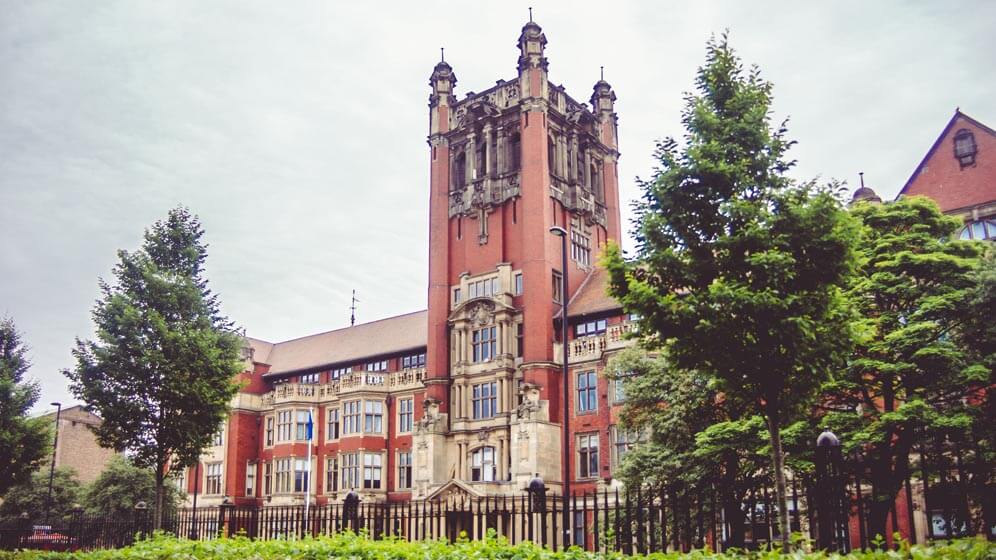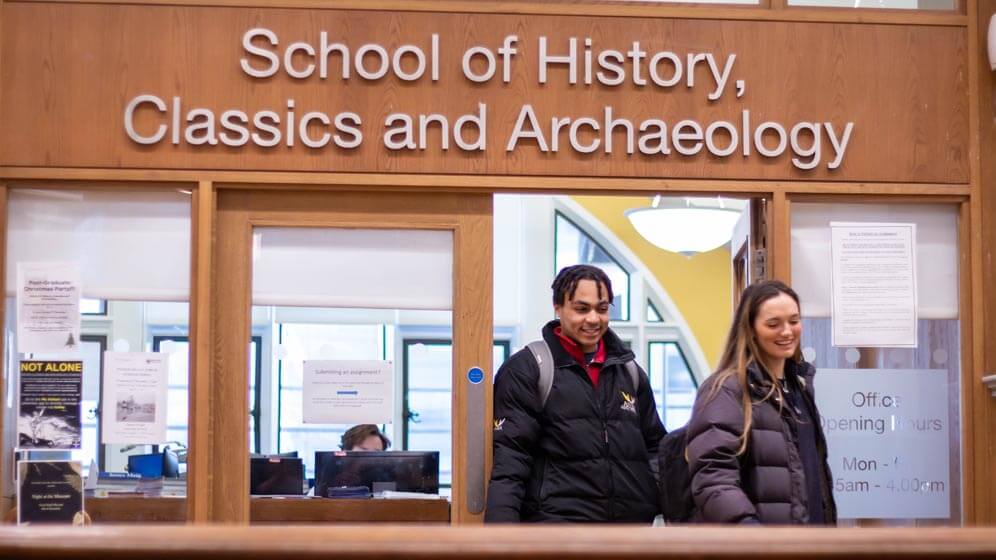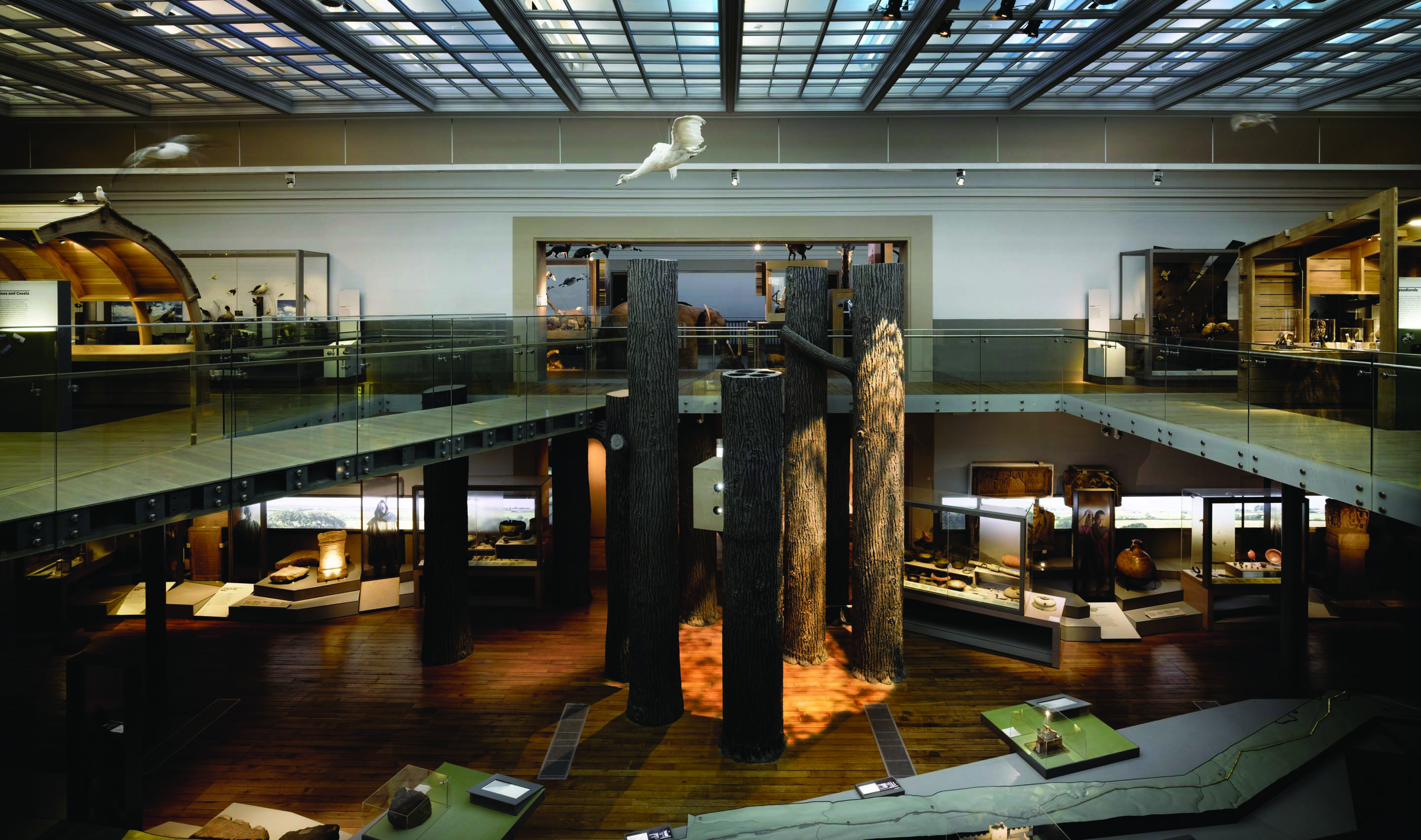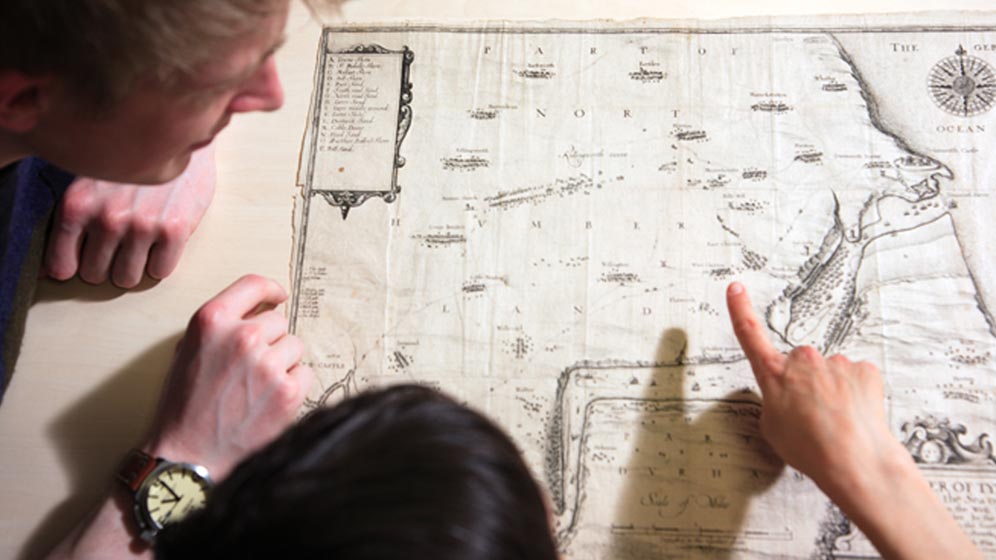Ancient History and History BA Honours
- UCAS code: VV11
- Full time
- 3 years
Explore history from the ancient world through to the present day.
You are currently viewing course information for entry year: 2026
Next start date:
- September 2026
UCAS Institution name and code:
- NEWC / N21
Course overview
Combine the study of the classical world with modern history and discover how the ancient world has shaped modern society.
On our BA Honours in Ancient History and History you’ll develop a diverse set of research, communication, and critical analysis skills that will set you on a path to wide range of careers.
Build cultural awareness by making connections with the past and understanding important issues in history.
Examine historical issues such as political change, gender and sexuality, conflict, or even historical representation in film.
Discover the global ancient world using a variety of evidence. From analysing ancient texts to studying historical artefacts, you'll develop a broad range of skills.
Be inspired by our unique location. Your classroom extends beyond the University and into North East England’s diverse heritage. From Hadrian's Wall to Bamburgh Castle on the Northumbrian coast, there's a rich past to discover on our doorstep.
Key features
You'll explore a range of global histories and develop your skills as a historian through compulsory modules. While optional modules allow you to tailor your degree to your interests.
Choose from a range of modules covering the Roman World and Hellenistic Empires, to fictional histories and slavery in the ancient, modern and early modern periods.
You’ll also have the opportunity to discover the societies and cultures of the past, explore the culture and literature of the Greek and Roman world, and study an ancient language.
On this degree you’ll have the opportunity to:
- Learn from experts in the ancient world and history, from the culture and literature of Ancient Greece to the history of Medieval Japan
- Access world-class facilities, including the University’s Special Collections and Archives department and Great North Museum
- Enhance your employability by taking a 12-month year work placement and put your learning into practice
- Study abroad for a year at one of our partner institutions
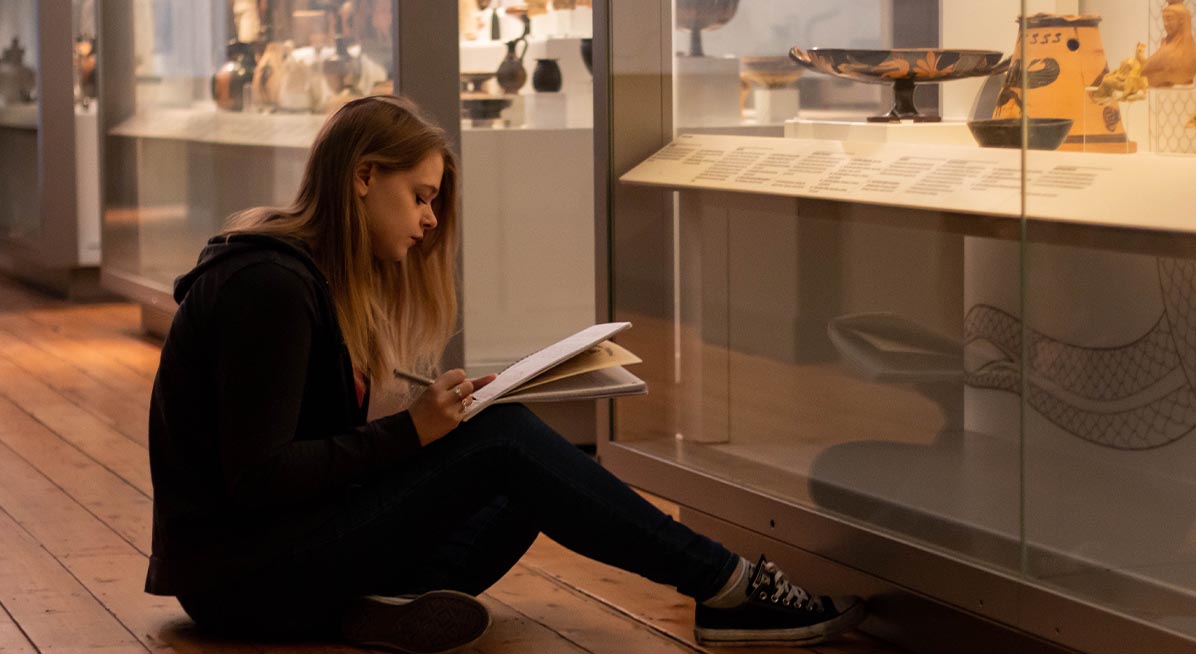
Your course and study experience - disclaimers and terms and conditions
Please rest assured we make all reasonable efforts to provide you with the programmes, services and facilities described. However, it may be necessary to make changes due to significant disruption, for example in response to Covid-19.
View our Academic experience page, which gives information about your Newcastle University study experience for the academic year 2025-26.
See our terms and conditions and student complaints information, which gives details of circumstances that may lead to changes to programmes, modules or University services.
Quality and ranking
Professional accreditation and recognition
All professional accreditations are reviewed regularly by their professional body.
Modules and learning
Modules
The information below is intended to provide an example of what you will study.
Most degrees are divided into stages. Each stage lasts for one academic year, and you'll complete modules totalling 120 credits by the end of each stage.
Our teaching is informed by research. Course content may change periodically to reflect developments in the discipline, the requirements of external bodies and partners, and student feedback.
Optional module availability
Student demand for optional modules may affect availability.
Full details of the modules on offer will be published through the Programme Regulations and Specifications ahead of each academic year. This usually happens in May.
To find out more please see our terms and conditions
Shape your degree to explore the periods and regions that excite you most.
Engage with a wide range of themes, including law and order, empire and resistance, slavery, gender, and religion.
Learn how to critically analyse complex and challenging sources, and how to articulate arguments to the highest standard.
Stage 1
In your first year you'll develop historical skills and knowledge through historical debate. You’ll also investigate a range of global ancient histories, beyond the worlds of ancient Greece and Rome, exploring evidence and interesting historical problems from a variety viewpoints and sources.
You’ll choose a core module from both History and Ancient History and then select from a range of optional modules.
Modules
You will take all of the following modules:
| Compulsory modules | Credits |
|---|---|
| Evidence and Argument | 20 |
| Global Ancient Histories | 20 |
All students will take at least one of the following modules:
| History modules | Credits |
|---|---|
| Historical Sources and Methods | 20 |
| History Lab I | 20 |
| History Lab II | 20 |
| Introduction to Public History | 20 |
| What Is History For? | 20 |
All students will take at least one of the following modules:
| Ancient History modules | Credits |
|---|---|
| West meets East: Greek History and Society | 20 |
| The Roman World from Romulus to Trajan | 20 |
There is also a list of recommended modules for students to pick any remaining credits from:
| Recommended modules | Credits |
|---|---|
| Greek and Roman Art and Archaeology | 20 |
| The World of Latin Literature | 20 |
| Tragedy, Comedy, History: the World of Greek Literature | 20 |
| How Should I Live? An Introduction to Ancient Philosophy | 20 |
| Global Middle Ages | 20 |
| Stuff: living in a material world | 20 |
| One or two modules in Greek or Latin at Beginners’ or Intermediate level. | 20 - 40 |
During Stage 2 you’ll take a training module to help prepare you for independent research. This is key preparation for your dissertation.
Modules
Students must select one Dissertation training module from the list below, they cannot take both modules.
| Module title |
Credits |
|---|---|
| Issues in Ancient History | 20 |
| Crafting History: Developing a Research Proposal | 20 |
Students choose a remaining 5 modules from a large range of optional modules ensuring they take both Ancient History and History modules.
During Stage 3 you'll continue with a mixture of Ancient History and History, choosing which areas to undertake your dissertation in and then selecting 4 further optional modules.
Modules
All students will choose a dissertation module:
| Module title | Credits |
|---|---|
| Writing History | 40 |
| Dissertation in Classics and Ancient History | 40 |
Note: Students may not take the CAC3***-coded version of any module whose CAC2***-coded version they took at Stage 2.
We base these figures and graphs on the most up-to-date information available to us. They are based on the modules chosen by our students in 2024-25.
Teaching time is made up of:
- scheduled learning and teaching activities. These are timetabled activities with a member of staff present.
- structured guided learning. These are activities developed by staff to support engagement with module learning. Students or groups of students undertake these activities without direct staff participation or supervision
Teaching and assessment
Teaching methods
You'll be taught through a dynamic range of methods and activities, including:
- lectures
- seminars
- tutorials
- workshops
- practical activities
- site visits and fieldwork training
- independent study
Assessment methods
You'll be assessed through a combination of:
-
Assessments
-
Assignments – written or fieldwork
-
Coursework
-
Dissertation or research project
-
Essays
-
Examinations – practical or online
-
Portfolio submission
-
Practical sessions
-
Reports
-
Seminar tasks/exercises
Skills and experience
Practical skills
Practical experience forms a key part of this interdisciplinary degree. You'll gain hands-on experience handling artefacts from our on-campus Great North Museum.
Research skills
In your final year, you'll write a dissertation on a topic of your choosing, using skills you have developed during your degree. You'll hone your investigative skills, undertaking independent research, with access to extensive resources, archives and special collections.
Opportunities
Study abroad
Experience life in another country by choosing to study abroad as part of your degree. You’ll be encouraged to embrace fun and challenging experiences, make connections with new communities and graduate as a globally aware professional, ready for your future.
You'll have the opportunity to study abroad for a full year either after Stage One or after Stage Two. You can study in an EU country as part of a study abroad exchange or further afield. You’ll then return to Newcastle to complete your degree.
In Europe we currently have links with:
- Cité Internationale Universitaire de Paris, France
- Universidad Carlos III de Madrid, Spain
- Leiden University, Netherlands
- Charles University Prague, Czech Republic
- University of Ljubljana, Slovenia
- Södertörn University, Sweden
- University of Turku, Finland
If you choose to study abroad, it will extend your degree by a year.
Find out more about study abroad
Work placement
Get career ready with a work placement and leave as a confident professional in your field. You can apply to spend 9 to 12 months working in any organisation in the world, and receive University support from our dedicated team to secure your dream placement. Work placements take place between stages 2 and 3.
You'll gain first-hand experience of working in the sector, putting your learning into practice and developing your professional expertise.
If you choose to take a work placement, it will extend your degree by a year, and your degree title will show you have achieved the placement year. A work placement is not available if you're spending a year studying abroad. Placements are subject to availability.
Facilities and environment
Facilities
You'll be based in the School of History, Classics and Archaeology, located at the heart of campus in the historic Armstrong Building. You'll have access to excellent study resources including:
- the Philip Robinson University Library, which houses over 800,000 books and provides access to ca. 1.8m e-books
- Special Collections & Archives – a rich collection of archival material, historical medical texts and rare books
- The Great North Museum: Hancock, our on-campus museum which holds an extensive collection of Greek, Roman, and Etruscan artefacts, as well as the Library of the Society of Antiquaries of Newcastle.
Find out more about the School of History, Classics and Archaeology
Support
You'll be welcomed into a vibrant and supportive community. We will ensure you are well placed to achieve your highest potential and are equipped for career success.
You'll have the support of an academic member of staff as a personal tutor throughout your degree to help with academic and personal issues.
Peer mentors will help you in your first year. They are fellow students who can help you settle in and answer any questions you have when starting university.
Your future
Join a network of successful graduates
A degree in Ancient History and History will give you a wide range of knowledge and skills. Once you graduate you’ll have the skills to research complex topics independently and think critically about information from different sources.
You’ll have highly developed communication and organisational skills. In addition, studying for a joint honours degree allows you to become intellectually versatile as you switch between different disciplines.
Our graduates have gone on to work in a diverse range of sectors including finance, public policy and government, civil service, education, marketing, business, law and museum and heritage.
Read more about the careers our graduates have gone in to
Make a difference
Sorry, you need JavaScript to view this video
Careers support
Our Careers Service is one of the largest and best in the country, and we have strong links with employers. We provide an extensive range of opportunities to all students through our ncl+ initiative.
Visit our Careers Service website
Recognition of professional qualifications outside of the UK
If you’re studying an accredited degree and thinking about working in Europe after you graduate, the best place to find current information is the UK Government’s guidance on recognition of UK professional qualifications in EU member states. This official resource explains whether your profession is regulated in another country, what steps you need to take, and which organisation you should contact.
Entry requirements
All candidates are considered on an individual basis and we accept a broad range of qualifications.
The entrance requirements and offers below apply to 2026 entry.
| A-Level | |
|---|---|
| International Baccalaureate | |
|---|---|
Other UK and the Republic of Ireland qualifications
Alternative offers at Newcastle
Through one of our contextual or alternative offer routes, you could receive an offer of up to three grades lower than the typical requirements.
Contextual offers
We use certain contextual data from your UCAS form, alongside your application, to consider challenges that you may have faced in your education and the potential effect this may have had on your qualifications. This means you may be eligible to receive a lower contextual offer.
PARTNERS offers
One of the largest and longest support entry routes to university of its kind for students from underrepresented backgrounds. We support applicants from application through to study.
Realising Opportunities offers
A unique programme delivered in collaboration with 10 leading, research-intensive universities in the UK. The programme is open to students in Year 12/first year of college.
Pathways to Newcastle offers
Pathways to Newcastle, our national skills entry route, is available for specific subject areas.
High Performance Athletes
We support promising athletes at the application stage, who compete in regional, national or international levels in their sport.
Qualifications from outside the UK
English Language requirements
Entrance courses (INTO)
International Pathway courses are specialist programmes designed for international students who want to study in the UK. We provide a range of study options for international students in partnership with INTO.
These courses are specifically designed for international students who want to study in the UK and progress onto one of our undergraduate degrees. Our International Study Centre, has a range of study options including:
- International Foundation
- International Year One
- English Language courses
Find out more about International Pathway courses
Admissions policy
This policy applies to all undergraduate and postgraduate admissions at Newcastle University. It is intended to provide information about our admissions policies and procedures to applicants and potential applicants, to their advisors and family members, and to staff of the University.
University Admissions Policy and related policies and procedures
Credit transfer and Recognition of Prior Learning
Recognition of Prior Learning (RPL) can allow you to convert existing relevant university-level knowledge, skills and experience into credits towards a qualification. Find out more about the RPL policy which may apply to this course.
Tuition fees and scholarships
Tuition fees for academic year 2026-2027
The 2026 entry home fees have not yet been confirmed.
| Qualification: BA Honours | |
|---|---|
|
Home students full time 3 years |
Tuition fees (Year 1)
Not set |
|
International students full time 3 years |
Tuition fees (Year 1)
24,500 |
Year abroad and additional costs
For programmes where you can spend a year on a work placement or studying abroad, you will receive a significant fee reduction for that year.
Some of our degrees involve additional costs which are not covered by your tuition fees.
Scholarships
Find out more about:
Open days and events
You'll have a number of opportunities to meet us throughout the year at our on-campus and virtual open days.
You'll be able to:
- explore our beautiful campus
- find out about our vibrant city
- discover what students think about studying at Newcastle
You'll also have the opportunity to speak to academic staff and find out more about the subjects you're interested in.
Find out about how you can visit Newcastle in person and virtually.
We regularly travel overseas to meet with students interested in studying at Newcastle University. Visit our events calendar to find out when we're visiting your region.
How to apply
Apply through UCAS
To apply for undergraduate study at Newcastle University, you must use the online application system managed by the Universities and Colleges Admissions Service (UCAS). All UK schools and colleges, and a small number of EU and international establishments, are registered with UCAS. You will need:
- the UCAS name and institution codes for Newcastle University (NEWC/N21)
- the UCAS code for the course you want to apply for
- the UCAS 'buzzword' for your school or college
If you are applying independently, or are applying from a school or college which is not registered to manage applications, you will still use the Apply system. You will not need a buzzword.
Apply through UCASApply through an agent
International students often apply to us through an agent. Have a look at our recommended agents and get in touch with them.
Get in touch
By phone
Call us on +44 (0) 191 208 3333 and press option 1. Our opening hours are Monday to Friday 10am until 4pm.
Live chat
Our NCL chatbot might be able to give you an answer straight away. If not, it’ll direct you to someone who can help.
You'll find our NCL chatbot in the bottom right of this page.
Online
Chat to our students
Choosing a university is a big decision. If you've got questions about a particular course, student life or the city of Newcastle, why not chat to our friendly students or graduates!
Keep updated
We regularly send email updates and extra information about the University.
Receive regular updates by email







